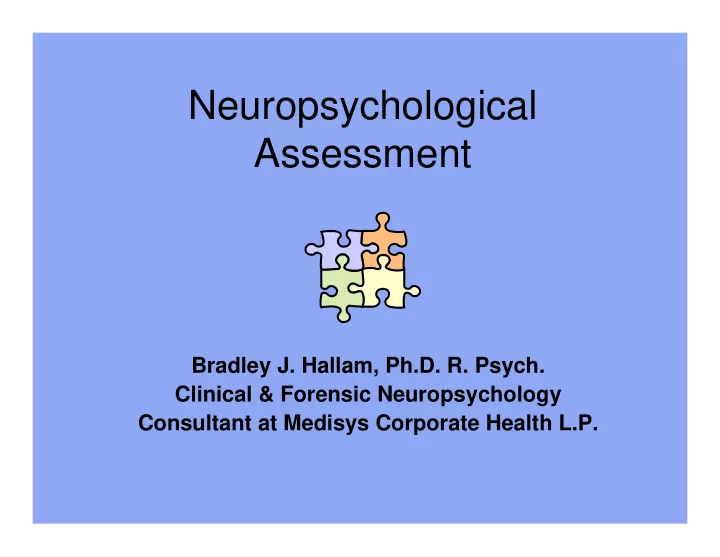

Neuropsychological Assessment Bradley J. Hallam, Ph.D. R. Psych. Clinical & Forensic Neuropsychology Consultant at Medisys Corporate Health L.P.
Neuropsychological Assessment Five parts: – Clinical Interview – Neuropsychological Testing – Mood & personality measures – Review of medical documentation – Collateral Interviews
Neuropsychological Assessment The neuropsychological opinion is based on analyzing and integrating hypotheses generated during testing with other clinical information about the individual’s neuropsychological status and functioning. The interpretation of test data is integrated with detailed behavioural observations, results of the record review and all other available information regarding the individual.
Neuropsychological Assessment Four-component consistency: 1. Are the data consistent within and between neuropsychological domain? 2. Is the neuropsychological profile consistent with the suspected etiologic condition? 3. Are the neuropsychological data consistent with the documented severity of injury? 4. Are the neuropsychological data consistent with the subject’s behavioural presentation? Forensic Neuropsychology: A Scientific Approach (2005). Ed. G. J. Larrabe. Oxford University Press.
Neuropsychological Assessment Standardized measures - standard instructions to ensure that tests are given the same way every time. Normative data - reference groups which allow you to gauge the claimant’s performance relative to demographically matched samples.
Neuropsychological Assessment Symptom Validity - assesses for suboptimal performance on tests that are created to be objectively quite easy, even for severely brain injured or mentally retarded individuals .
Neuropsychological Assessment Neuropsychological Testing • Attention • Working Memory • Language • Visuospatial • Memory • Executive Functions • Motor
Neuropsychological Assessment Intellectual function - assesses cognitive functions moderately related to achievement in academic settings and success in occupations requiring academic skills. Typically assessed by the WAIS-III which produces IQ scores and other indices.
Neuropsychological Assessment Predicted Intellectual Function - provides an estimate of intellectual function based on reading ability (i.e., pronunciation of irregular words). Reading scores are used because they add to prediction accuracy over and above demographic variables and because reading ability is often preserved in brain injury.
Neuropsychological Assessment Attention - assesses capacity to direct and sustain thoughts/actions. Working Memory - assesses capacity for holding and manipulating small amounts of information in mind for short periods of time (e.g., calculating the tip in your head at a restaurant).
Neuropsychological Assessment Language - assesses expressive (i.e., ability to communicate/express ideas verbally) and receptive (i.e., ability to comprehend verbal information) language skills.
Neuropsychological Assessment Visuospatial - assesses the capacity to understand and manipulate visually presented material, as well as understand spatial relationships.
Neuropsychological Assessment Executive Functions - a complex range of abilities that include the capacity to control and organize information. This domain also involves reasoning; judgment; the ability to plan and carry out behaviour; as well as to shift efficiently from one concept to another (mental flexibility). The capacity to initiate responses when needed and to inhibit appropriate responses are also measured.
Neuropsychological Assessment Motor - assesses fine motor speed, fine motor dexterity, and grip strength. More focused on assessing for lateralization of brain dysfunction.
Neuropsychological Assessment Memory - assesses the capacity to acquire learn, recall and retain verbal (e.g., word lists and short stories) and non-verbal (e.g., faces and geometric figures) over time. These tasks are typically referred to as “short term memory”.
Should I refer the individual for a neuropsychological evaluation?
Neuropsychological Assessment �������������������������������������
Neuropsychological Assessment ������������������������������������� ����� ������������� ������� ��������������� !�"����������"��� ����������� �����������"��� �������� �������������������������������
Recommend
More recommend